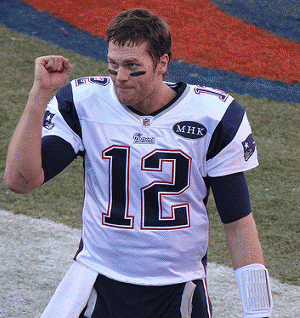Reprinted from Consortium News
It's been my experience from nearly four decades in Washington journalism that it's increasingly rare when a powerful institution protects an individual from unfair and abusive treatment by another powerful institution. The U.S. District Court decision throwing out the National Football League's kangaroo case against New England Patriots quarterback Tom Brady was one of those exceptions.
I realize that some readers feel that I should not have "wasted" time examining the scientifically flimsy case known as Deflategate or observing how the NFL's supposedly "independent" investigation slanted what little evidence it had to support the league's initial rush to judgment and harsh punishment of Brady. One reader joked it was just a case about men and their balls.
And I initially had no intention of writing about this topic. But I noted a disturbing haste in the conclusions about Brady's guilt and I then read the Wells report last spring out of curiosity. What I found in it was what I had seen in so many other bogus investigations that start with a conclusion and make the "facts" fit.
My annoyance also didn't stop with the NFL. It extended to the news media, where -- from The New York Times to ESPN -- the NFL's case was accepted as unassailable and Brady was casually denounced as a cheater and a perjurer. Considering how much ink and time were devoted to this overblown Deflategate "scandal," there was almost no serious examination of the actual evidence.
Yet, here was the NFL, an institution with arguably as much integrity as the tobacco industry in how they deal with facts. The NFL has covered up the risks of concussions much as the cigarette makers hid the cancer implications of smoking. Why would anyone trust the NFL about anything? I have asked similar questions when news organizations fall on their knees and bow to U.S. government claims about foreign "enemies" as with Iraq and its non-existent WMD stockpiles.
Over the years, again and again, I have seen not only large institutions lie but the media side with those powers-that-be even when the institutions have a long record of dishonesty and high-handedness. As long as the corrupt are well-connected, they tend to get protected -- given every break and benefit of every doubt -- but the decent folks under attack are usually out of luck.
Real-life in modern America is seldom like one of those Hollywood movies when some honest person-on-high steps in at the last minute to set things right and prevent some abuse from being inflicted on an individual. Usually some backroom deal is struck to let the powerful win and leave some expendable citizen to suffer. In such cases, truth and justice are never a priority.
Just think of the U.S. government's and mainstream media's mistreatment of Gary Webb for reviving the Contra-cocaine scandal, or the 35-year sentence meted out to Chelsea Manning for exposing U.S. war crimes. Compare those cases to the failure to hold anyone from George W. Bush's administration accountable for aggressive war and torture, or the absence of any prosecutions of the banks and bankers who blew up the world's economy in 2008.
So, even though the four-game suspension of Brady and other punishments meted out by the NFL over Deflategate pale by comparison to some other injustices, the case had enough similarities to merit, in my view, several articles examining the multiple flaws in the NFL's case.
The Judge's Ruling
Though Judge Richard Berman's 40-page ruling on Thursday focused mostly on the NFL's arbitrary process -- rather than the underlying facts of the case (all the better to survive the NFL's legal appeal) -- Berman clearly was underwhelmed by the substance, too. He put quotes around the word "independent" when referring to the report by the NFL's outside counsel Ted Wells, noting the involvement of the NFL's executive vice president and general counsel Jeff Pash in editing the report.
Berman also noted that there was no direct evidence proving that Brady did anything wrong. Berman puzzled over the NFL's vague accusation that it was "more probable than not" that Brady was "generally aware" of alleged actions by two locker-room assistants -- Jim McNally and John Jastremski -- to deflate the footballs used in the Jan. 18 American Football Conference championship game.
"I am not sure that I know what in the world that means, that phrase ['generally aware']. " Did he [Brady] know that McNally took the balls unaccompanied into the bathroom? Did he know that in the bathroom, if in fact it happened, McNally deflated the balls? Did he know that McNally then went on to the field with the balls?"
In his ruling, Berman also noted the refusal of NFL Commissioner Roger Goodell to let Brady's lawyers question Pash about his role, one of a number of capricious decisions that pervaded Goodell's role as arbitrator on Brady's appeal of a ruling that Goodell had authorized if not dictated in the first place. Berman, in effect, concluded that the process lacked anything approaching fairness.
(Note: You can view every article as one long page if you sign up as an Advocate Member, or higher).






